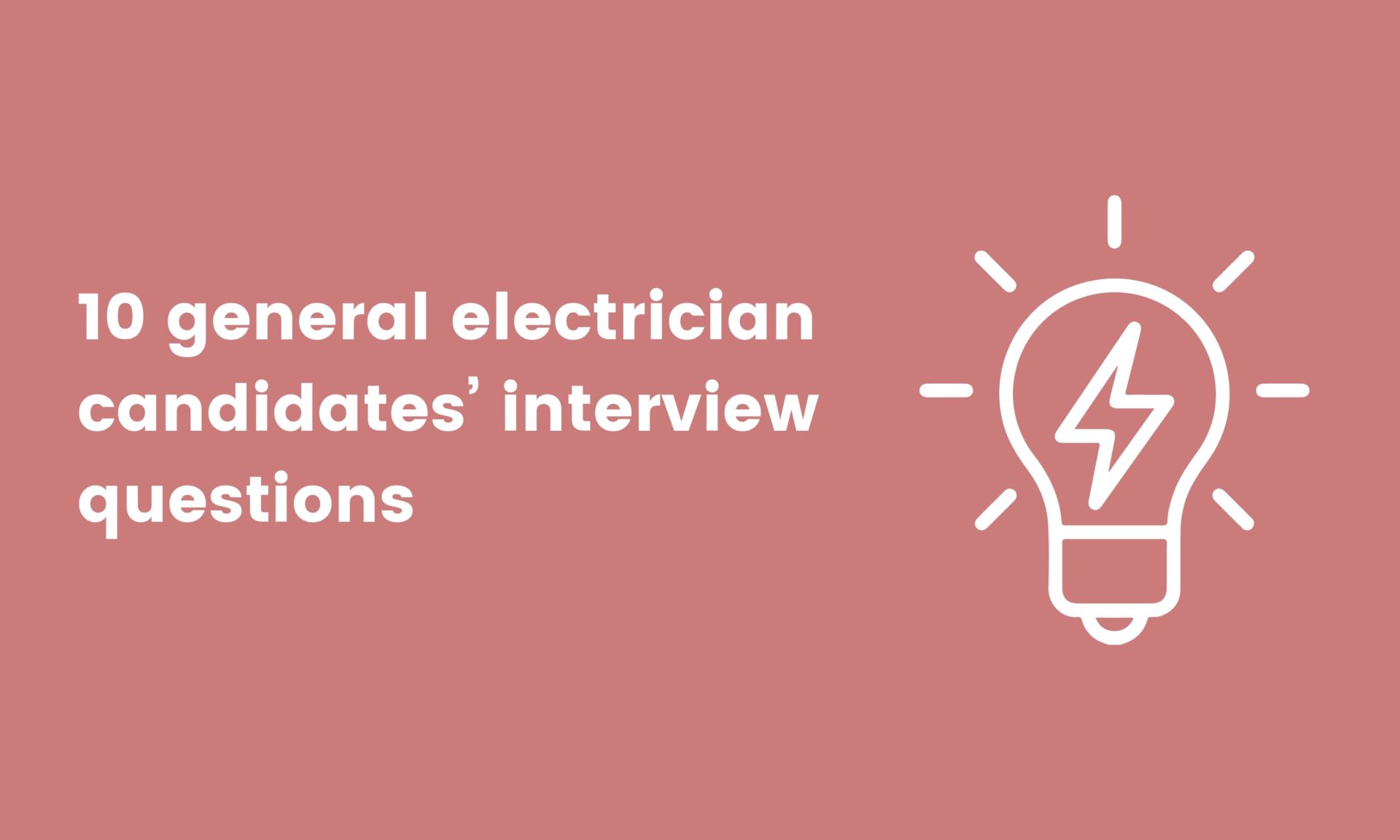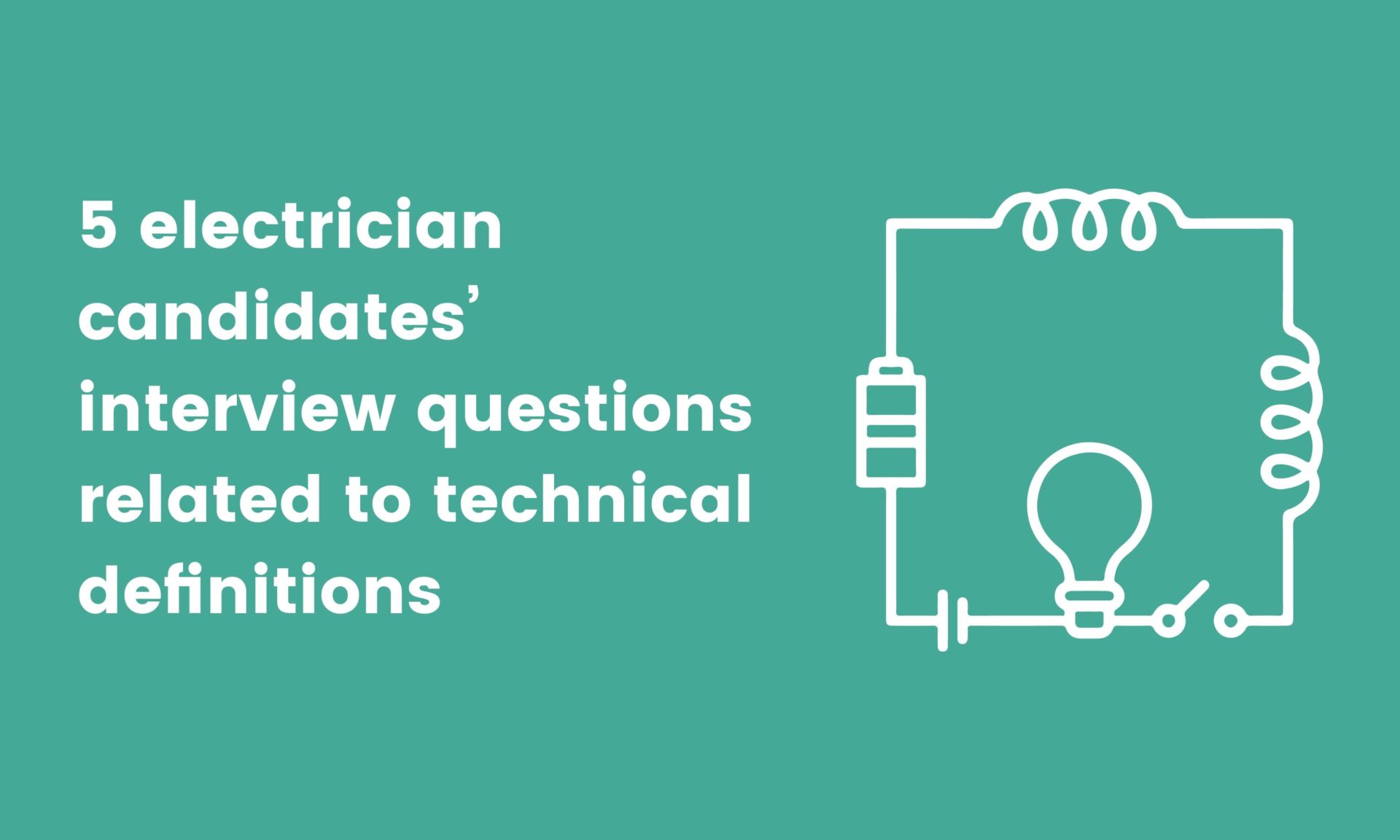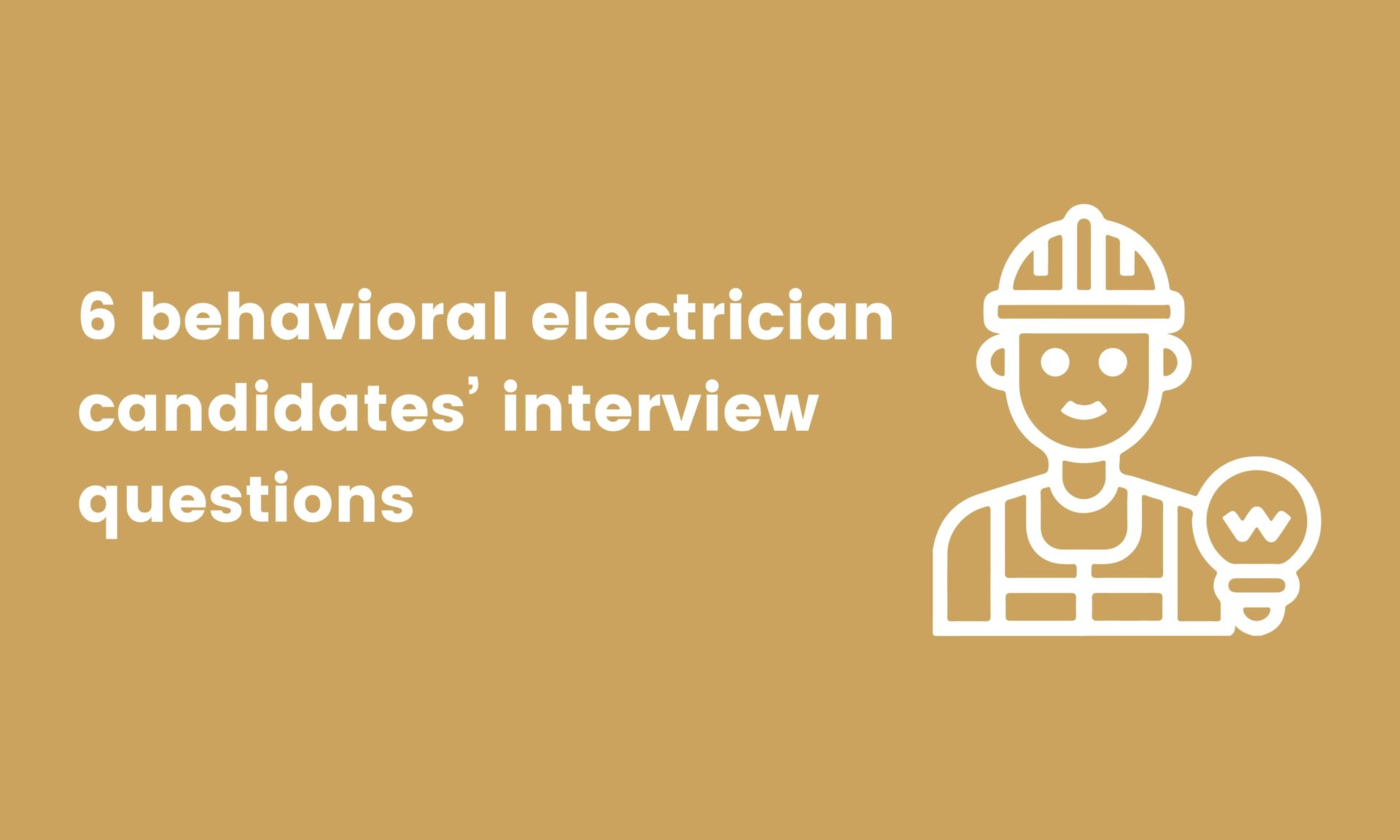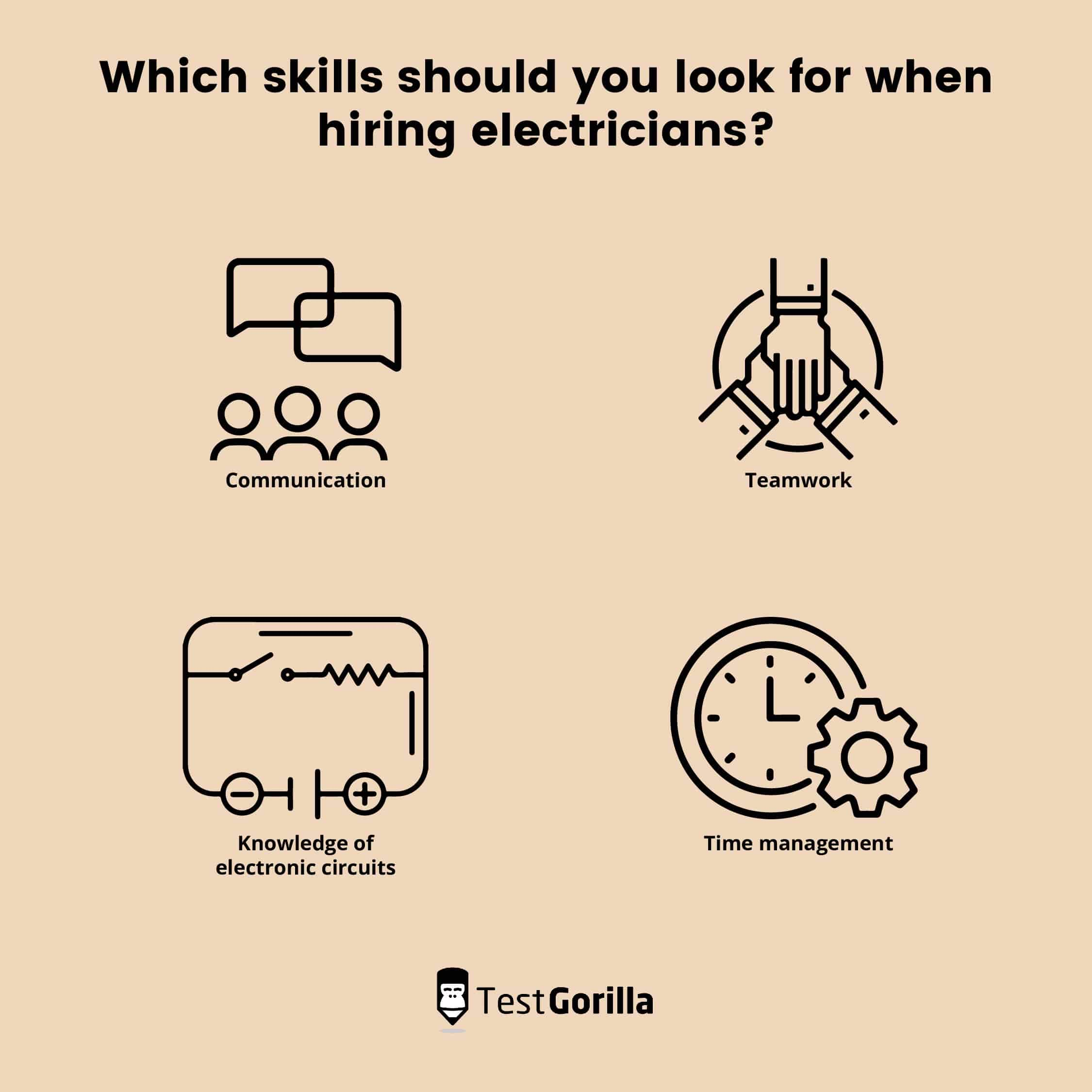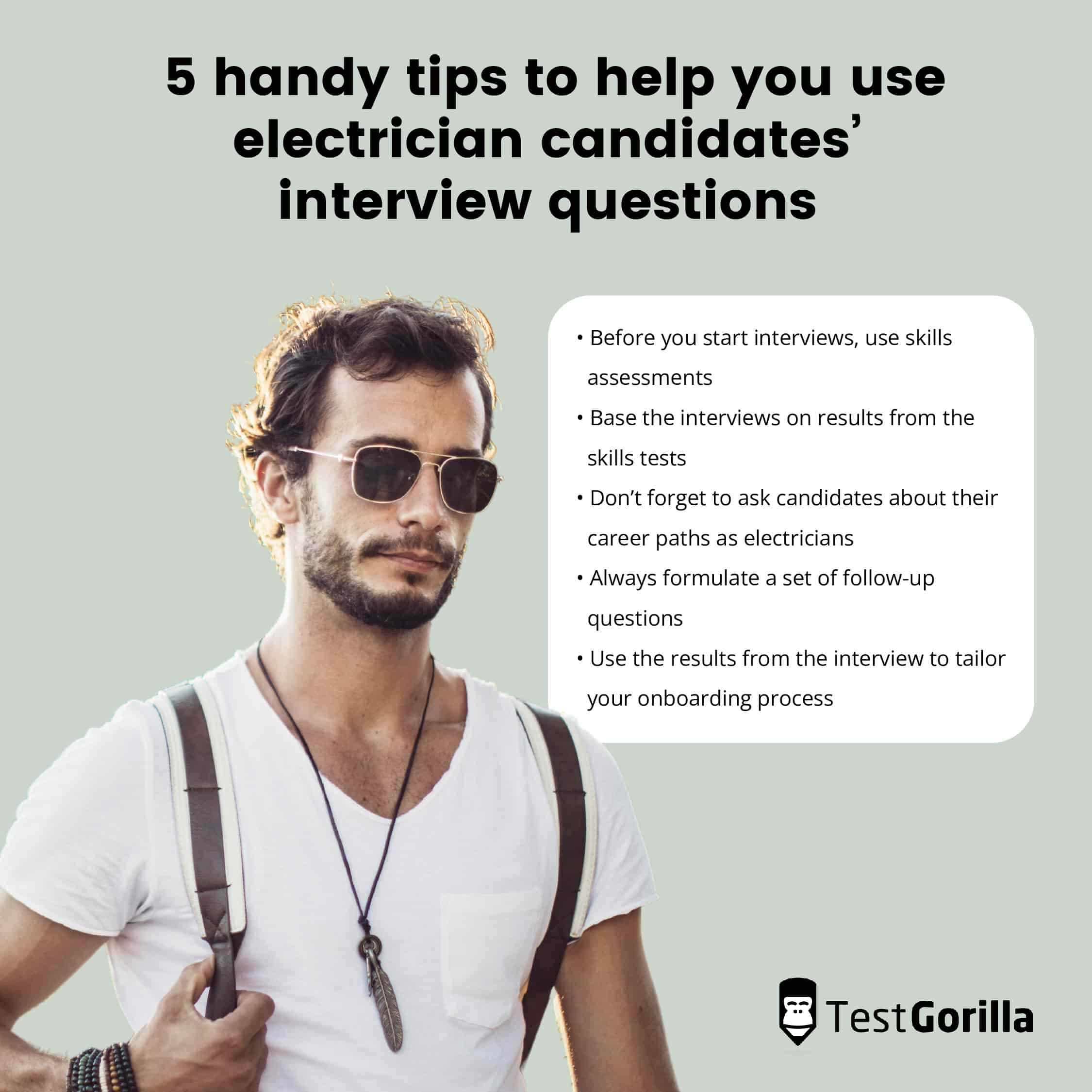21 electrician candidates’ interview questions
If you’re hiring an electrician for your enterprise, you may wonder how to efficiently assess their skills.
You need to make sure your applicants understand the fundamentals of electricity and have the right skills to work independently.
So, what’s the best way to assess your candidates’ qualities and expertise?
First, use a skills assessment featuring a Fundamentals of Electricity test to evaluate their knowledge, and then invite qualified applicants to an interview to get a deeper understanding of their skills. For this, you need the right interview questions – but we’ve got you covered!
In this article, you’ll find a list of 21 electrician candidates’ interview questions to help you prepare for the interview, along with information about the answers you can expect.
Table of contents
- 10 general electrician candidates’ interview questions
- 5 electrician candidates’ interview questions related to technical definitions
- 6 behavioral electrician candidates’ interview questions
- Which skills should you look for when hiring electricians?
- 5 handy tips to help you use electrician candidates’ interview questions
- Hire the best electrician with the right interview questions
10 general electrician candidates’ interview questions
This section features 10 general interview questions that you can ask when interviewing electrician candidates to assess their knowledge.
1. What are your specific areas of expertise as an electrician?
Ask candidates about their areas of expertise as electricians to learn whether their experience matches your requirements. Candidates may mention a range of backgrounds, such as maintenance or residential work.
If their expertise doesn’t match your needs, look for responses that show enthusiasm for learning more about the specific role.
2. Explain which project has been your most successful one and why.
With this question, you’ll find out whether your applicants have completed a sufficient amount of successful projects to become an asset to your team.
Candidates should demonstrate that they can complete jobs efficiently and on time. For example, they may have completed rewiring work for a commercial building ahead of the deadline, or successfully troubleshooted an industrial electrical installation under lots of pressure.
3. Which skills are required to be a successful electrician?
Problem-solving skills are crucial for successful electricians, as well as critical thinking. Candidates may also mention that technical abilities are crucial, such as rewiring skills. They may note that communication skills are essential for sharing information with clients and that math skills play a vital role in completing calculations on the job.
4. Describe your experience as an electrician.
Your applicants may each provide unique descriptions of their experiences as electricians. Look for a candidate whose experience is relevant to your open position. If your candidates have gaps in their employment, ask follow-up questions to learn how they maintained their technical skills in the intervening period.
5. What do you hope to achieve in three years?
Candidates should aspire to improve their skills. Look for responses that indicate a desire to remain with your business and demonstrate continuity and career progression.
6. What made you choose a career as an electrician?
Although responses may vary, applicants should show that they are passionate about their careers. Have your candidates always found electrician work rewarding? Look for answers that show your applicants’ passion and willingness to learn new skills: This attitude is important for career progression.
7. Do you have an electrician license? How about additional qualifications?
An electrician license (known as journeyman’s electrician license in the States) is essential in this field. Do your candidates have the right license to work as electricians? Do they also have any additional certifications or qualifications that help them prove their experience and capabilities?
8. Have you worked on different electrical systems? Can you give an example?
Each candidate may outline some unique electrical systems that they have worked on previously. Some may mention that they have worked on systems that function with center-tapped neutrals. Others may mention that they have worked on systems with insulation faults.
Take note of candidates whose experiences best match your organization’s specific job requirements.
9. What would your previous boss say about your soft skills?
Candidates may mention that their previous boss considers them good at problem-solving or that they’d say that they have top communication skills. They may be good at team collaboration or time management.
Regardless of the skills they describe, can your candidates explain how they have used these soft skills to complete previous projects successfully?
10. Which is the most critical safety equipment item for electricians?
Do your candidates know that protecting the head is vital and that it can even supersede shock risks protection? Can they explain that insulated gloves are also important when working with high-voltage circuitry?
5 electrician candidates’ interview questions related to technical definitions
In this section, you’ll find five electrician candidates’ interview questions related to technical definitions to test your applicants’ knowledge more thoroughly.
1. What is an earthed or grounded system?
Has your candidate worked with earthed systems? Ask this question to find out how comprehensive their knowledge is. Applicants may explain that such a system connects the power with the earth (or ground) for safety reasons. They may also explain that the ground is normally the Earth’s conductive surface.
2. What is an unearthed system?
Does your candidate understand how earthed or grounded systems are different from unearthed systems? Can they explain that an unearthed or ungrounded system has no intentional connection to the earth? They may also explain that an unearthed or ungrounded cable needs greater insulation when compared with an earthed or grounded cable.
3. What is a fuse?
Find out whether your candidates have a good working knowledge of this crucial part of circuitry by asking this question. Capable candidates should explain that a fuse is an item that protects circuits from overloading by breaking the current.
4. What is a breaker?
Learn whether your candidates understand another essential element used in circuitry by asking them this question. Candidates should be able to explain that a breaker also protects circuits from overloading by breaking the continuity of the current.
5. How are fuses different from breakers?
Do your candidates understand that although fuses and breakers perform similar actions, they work differently? Can they explain that a fuse can melt if they overheat, whereas a breaker’s switch will activate and prevent circuit overload?
The best insights on HR and recruitment, delivered to your inbox.
Biweekly updates. No spam. Unsubscribe any time.
6 behavioral electrician candidates’ interview questions
Here are six behavioral electrician candidates’ interview questions and answers to find out how your candidates handle complex challenges during projects.
1. How do you resolve conflicts with other electricians?
Conflict resolution is an important skill, especially when proposing solutions to complex and sometimes dangerous issues.
Can your applicants explain how they would remain respectful of their team members’ ideas while suggesting alternative options to resolve the conflict? Do they have any other skills, such as empathy and communication, to help them?
2. Which challenges have you encountered on the job, and how did you resolve them?
Each of your candidates may outline a different challenge they encountered on the job.
For example, their equipment may have incurred damage during the project. They may have had issues with project scheduling or conflicts about time frames. Whichever challenge your candidate outlines, look for responses that show they were able to learn from it.
3. What keeps you motivated for each job?
Look for responses that show your candidates’ enthusiasm for electrical work. Candidates should show they have a passion for learning about electrical systems and may mention that it keeps them motivated to excel in each project.
4. Do you observe any safety procedures to avoid accidents during electrical installations?
Find out if your applicants are experienced electricians with recent up-to-date safety training by asking them this question.
Candidates should understand that tagging circuits and locking them out is important. They may also mention that wearing protective equipment is a critical safety procedure and that staying focused when working with overhead electrical lines is essential.
5. Which is your strongest asset or skill that helps you complete your projects?
Candidates may mention the key skills that help them complete their projects, such as teamwork, critical thinking skills, or communication skills. They should provide examples of how they used their strongest skills to complete challenging projects.
For example, if a job involved electric system diagnostics, the candidate may have had to relay the diagnostics to a client using strong communication skills.
6. Which approaches and steps do you take before completing a job?
There are a few important steps that candidates may mention in response to this question. Not only should they inspect the components for faults, but they should also:
Ensure the system is free from malfunctions using testing devices
Double-check the inspections before providing an installation certificate
Which skills should you look for when hiring electricians?
Knowing which skills you should look for when hiring electricians is vital and can help you formulate your interview questions.
Here are four skills you should consider:
Communication skills: Do your candidates have the right communication skills, such as active listening and the ability to interpret body language, to complete jobs effectively? Can your candidates clearly explain complex electrical diagnostic results to clients in a language they can understand?
Teamwork: Since teamwork is critical for electricians, knowing how well your candidates can work in a team is important.
Knowledge of electronic circuits: A crucial technical skill for electrician candidates is knowledge of electronic circuits. They should at least have an entry-level knowledge of electronic circuits, so testing this skill is vital.
Time management skills: Electricians must work against the clock. How good are your candidates’ time management skills?
5 handy tips to help you use electrician candidates’ interview questions
Consider these five tips to make the most of your hiring process and find the best applicant for your open role.
1. Before you start interviews, use skills assessments
Skills assessments give you comprehensive information on your candidates’ knowledge and skills. You can combine several skills tests (up to five) in a single assessment, and with the results, you’ll be able to fully understand your candidates’ strengths and identify the best talent.
Test your candidates’ technical electrical knowledge, soft skills, and personality traits. You can then decide who are the best candidates you should invite to an interview.
2. Base the interviews on results from the skills tests
If you need more ideas for electrician candidates’ interview questions, you can use the results of the skills tests for this.
For example, if you notice that your candidates have the required technical skills but lack the teamwork or communication skills to do the job, include more questions around soft skills.
If you find out that your applicants have experience with low-voltage circuitry but lack time-management skills, ask questions related to task completion and time management.
3. Don’t forget to ask candidates about their career paths as electricians
Open the interview by asking questions related to your candidates’ career path and then move on to the more technical questions. Using this approach will help you understand whether your applicants’ general experience aligns with the kinds of projects your enterprise focuses on.
Even if their experience doesn’t align with what you’re looking for, you could formulate follow-up questions to determine if they are willing to upskill and enhance their skills.
4. Always formulate a set of follow-up questions
If you meet applicants who have only just received their electrician’s license and lack experience, they may provide limited answers to your questions related to past jobs or specific projects.
In situations like these, you should have a set of follow-up interview questions to give candidates the chance to provide more comprehensive answers.
Some of the follow-up questions you may ask include:
Could you explain more about your last project – what made it a success?
How have your studies set you up for a successful electrician career?
You told us that protection and safety are important – what equipment is required for this, in your opinion?
5. Use the results from the interview to tailor your onboarding process
Once you’ve hired your electrician, you can look back at their answers to the interview questions and formulate training sessions based on your employee’s weaker responses.
For example, if your employee lacks teamwork skills, setting up training based on working as a team is one way to strengthen these skills.
Hire the best electrician with the right interview questions
If you’re trying to keep recruiting metrics like time to hire low, use skills testing in combination with the right set of electrician candidates’ interview questions to hire the best talent.
Use the questions listed in this article to assess your candidates efficiently, and remember to use skills tests before you conduct any interviews.
Find the best electricians for your organization, eliminate bias, and complete projects without difficulties with the help of skills testing and the right interview questions.
With TestGorilla, you’ll find the recruitment process to be simpler, faster, and much more effective. Get started for free today and start making better hiring decisions, faster and bias-free.
You've scrolled this far
Why not try TestGorilla for free, and see what happens when you put skills first.


